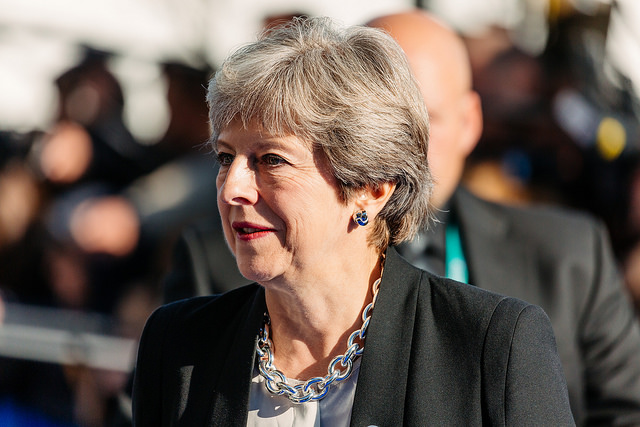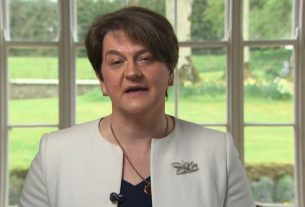Prime Minister Theresa May was accused of presiding over ‘a shambles’ after calling off tomorrow’s crunch vote on her Brexit withdrawal deal.
She will now go back to the EU to seek changes that will make it more palatable to MPs on all sides who were set to vote it down by a huge margin in Parliament.
But she was immediately warned by European Council president Donald Tusk that the 27 EU countries were not prepared to renegotiate the deal.
This includes the controversial Irish border backstop which has provoked most of the opposition in the Commons.
But Tusk did say that the EU 27 were prepared to explore ‘how to facilitate UK ratification’ of the withdrawal agreement at a Brussels summit on Thursday.
Mrs May scrapped the vote after conceding that Parliament would reject her deal ‘by a significant margin’ but said she was ‘confident’ of a positive EU response.
She and her ministers had previously been insistent that the vote would proceed, despite the strength of opposition ranged against it.
A number of MPs have called for the deal to be voted on before Christmas, but with Mrs May announcing a deadline of January 21 for it to be held, that looks unlikely.
Amid speculation about what will happen if the deal fails to get through, Mrs May said that the UK’s scheduled EU departure date of March 29 would stand.
She also rejected alternative options including calling a second referendum or general election or taking the UK out with no deal.
Mrs May promised that her deal would be put to a vote and said she would be raising the ‘clear concerns’ of MPs about the backstop with the EU.
She added that she would be looking at ways to give the House of Commons power to ensure that any Irish backstop does not become permanent by default.
Her deal was ‘the right one for Britain,’ she told MPs: “I am determined to do all I can to secure the reassurances this House requires, to get this deal over the line.”
The main barrier to the withdrawal agreement getting through Parliament is the proposed Northern Ireland backstop arrangement.
This is a legally-binding customs arrangement with the EU that would be triggered if a future deal cannot be reached that avoids the return of a hard border in Ireland.
Opponents say this would throw up an indefinite regulatory barrier between Northern Ireland and the rest of the UK, which would be unable to leave it without EU approval.
Tory rebels, Labour, the Scottish National Party, Liberal Democrats, Plaid Cymru and the Democratic Unionist Party were all expected to vote against the deal if it had gone ahead.
The cancellation of the vote sent the pound tumbling to an 18-month low against the US dollar.
The reaction
Labour leader Jeremy Corbyn had hoped to force a general election by tabling a vote of no confidence if Mrs May had lost tomorrow’s vote, but this idea has been shelved.
He said after the vote was cancelled that the government was ‘in chaos’ and that Mrs May had lost control of events and should step down as Prime Minister.
The DUP, whose backing Mrs May needs to vote through key legislation, are bitterly opposed to the backstop, describing it as a ‘red line’ that could never be crossed.
Their leader Arlene Foster said she had warned Mrs May that it must go and her deputy Nigel Dodds said the process had descended into “a bit of a shambles.”
He told Mrs May in the Commons: “Come back with the changes to the withdrawal agreement or it will be voted down.”
Tory Brexiteer Jacob Rees-Mogg issued a statement afterwards accusing the Prime Minister of ‘lacking the gumption’ to put her withdrawal deal before MPs.
He added: “This is not governing, it risks putting Jeremy Corbyn into government by failing to deliver Brexit. The prime minister must either govern or quit.”
Irish Taoiseach Leo Varadkar said the deal was the ‘only one on the table’ after 18 months of complex negotiations between the UK and EU.
He added that his government had already made concessions and warned: “It is not possible to reopen any aspect of that agreement without reopening all aspects of it.”




